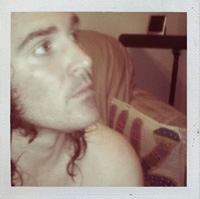I Find Writing Poetry Very Tough :
Stephen Leckie in Conversation with J. Mark Smith
 Malahat volunteer Stephen Leckie catches up with the winner of our 2012 Open Season Award for poetry, J. Mark Smith.
Malahat volunteer Stephen Leckie catches up with the winner of our 2012 Open Season Award for poetry, J. Mark Smith.In your 2007 collection Notes For A Rescue Narrative, “place” figures prominently in your experiences as a poet. How is "Landscape with petroleum plant and sewage treatment facility" similar or different from some of your favourite poems in that collection?
"Place" is a kettle of fish, isn't it? I have several thoughts about it. One is that to write with competence at this moment in time means you've learned at least some of the technique that was hard won by poets from the late eighteenth century onwards. That goes along with a philosophical and aesthetic inheritance too. I'm following on the coat-tails, then, of two centuries of thinking about the subjective experience of place and about the cultural significance of places.
Also, I might add that I was given a Wordsworthian sort of psyche by my early experiences (my father was a mountaineer who was killed in the Rockies when I was six). That is, certain Wordsworth poems, when I came upon them in my eighteenth year and later, helped me to decipher and become aware of my own blank spaces. But writing in the Wordsworthian vein is not a ticket to literary success in the early 21st century.
It may also be that my sense of self is strongly embodied. I recall in the sociologist Arthur Frank's book The Wounded Storyteller, a chart showing types of personality along a spectrum of identification with one's physical experience. Many people―I think many writers and poets too―live more abstractly, more in their minds. Their bodies are just along for the ride. There's a weird poem by A. F. Moritz in the Carcanet collection Modern Canadian Poets, edited by Todd Swift and Evan Jones. Its conceit is that the poet addresses his own body as if it were an aging pet. I was struck by the conceit, which I find nightmarish.
About Notes for a Rescue Narrative: I can see certain affinities between my contest-winning poem and "In the Pastures of the Horses of Empire." The latter has the same distanced observer, the animals (horses rather than coyote), the humanly complex environment (the harbour of Bombay rather than an Edmonton refinery and waste water treatment plant). I've never been to Bombay, by the way. I studied an old British colonial streetmap that I found on the internet.
Something that's different about the way I'm going these days with my writing is that everywhere I see the demarcations of social class―in just about every landscape. But the actual differentiations of social class seem to be becoming even more pronounced in my still-booming home town. (As reflected in the attempt earlier this year to launch a reality TV show here called "Northsiders"―the north side of the city is more blue collar, but also home to most of Edmonton's under-class.) I'm not talking about the 1% and the 99% either. I'm talking about the comfortable middle classes vs. those who are struggling to survive.
Has winning the contest affected the kinds of poems you write? Is the recognition from the contest different than the feeling of a poem being accepted for publication?
No, not much. I have written two or three more poems in the same form as "Landscape with petroleum plant and sewage treatment facility"―prose couplets of irregular length. Not exactly a prose poem, but nor is it free verse. Les Murray calls it "line scan" (I'm thinking of his poem for/about his autistic son). Maybe my variation is to put it in couplets.
The main thing I notice that's different about The Malahat Review’s contest is this interview thing you do. It provides a boost to a person's internet profile. I'm agnostic about what that means exactly with respect to career aspirations/recognition. But I appreciate the opportunity to be able to talk about my writing in public.
Do you have any future goals for your poetry? Are there places you have yet to visit?
I find writing poetry very tough. I'm trying to write good poems, rather than thematically or formally linked collections of poems. So I go poem by poem. I'm getting close, though, to finishing a second book-length bunch of poems. I'm working as well right now on a family memoir. It's about the length of a novella at present.
What is the importance of writing contests? Do you feel that they are necessary for readers, writers, and the literary magazines?
I understand that they're a way to keep literary magazines alive. To be honest, I mostly have avoided them in the past. But I've made an exception for a couple of Malahat contests because I have a high opinion of this journal and am glad to support it. And for this writer, a deadline can be a helpful thing.

Stephen Leckie
* * * * * * * *
Check out the guidelines for our 2013 Open Season Awards .









